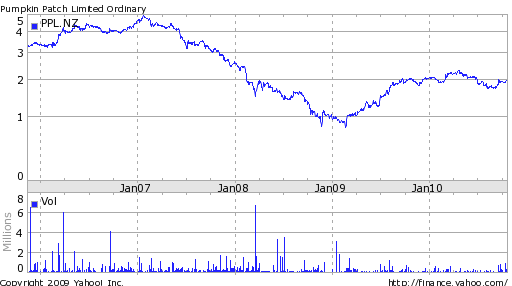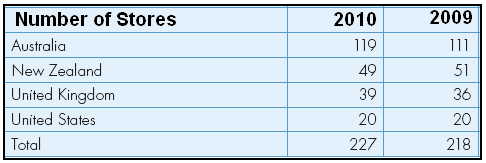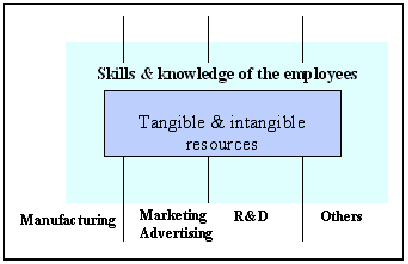Introduction
The purpose of this case study is to consider the external and internal environments, strengths, weaknesses, opportunities, threats, core competencies, and future strategies of Pumpkin Patch.
Company Overview
According to Pumpkin Patch (2010), Pumpkin Patch is a New Zealand based corporation- it is Australasia’s largest kids wear business with its operations in UK, US, NZ, and Australia; together with its subsidiaries, the group specializes in designing, advertising, retailing and wholesaling of kid’s wears.
The business possesses five operating divisions that consist of four geological areas where its retail chain operates and one wholesale or direct division consecutively in UK, US, Australia, and NZ; its subsidiaries comprises Pumpkin Patch LLC, Torquay Enterprises Ltd, Pumpkin Patch Originals Ltd, Pumpkin Patch (Australia) Pty Ltd, Pumpkin Patch Ltd, Pumpkin Patch Wholesale LLC and Pumpkin Patch Direct Ltd.
As part of its business strategy, in June 2009, Pumpkin Patch restructured thirty-five retail shops in the US that ran below Pumpkin Patch LLC and closed-up fifteen other shops.
Analysing the external environment of Pumpkin Patch
Demographic
Pumpkin Patch is a New Zealand-based business with its operations in Australia, UK, and US as well;
New Zealand has a total population of 4,213,418 from where the Pacific population now build-up 6.9 % of the total NZ population. Multiple ethnicities are most common among younger Pacific populace and the average age of the NZ-born Pacific group is 13 years contrasted to 39 years for the overseas-born;
The Pacific group as a whole has a greatly younger age composition than the total population, which means that the target customers (kids) of Pumpkin Patch is higher.
Conversely, Australia has a population of 22,451,601m, and the population has five unlike quintiles of gross household-income per week starting from AU$ 319 to AU$ 1096 weekly; generally, more than 90 percent of Australian citizens represented the middle-income class.
Economic
The 2010 fiscal year substantiated to be rather complicated for the company because of the continuance of the recessionary affect that the company faced in 2008 to 2009 period creating difficult general retail environments for all of its trading entities. As per Yahoo Finance (2010), during this time, the share prices of the company faced a sudden slump as shown in the figure below:

Figure: Basic Chart of Pumpkin Patch Ltd (PPL.NZ) for 2006 to 2010
Source: Yahoo Finance (2010)
In spite of these tough situations, Pumpkin Patch engendered a quite remarkable development in income and sustained to expand the Pumpkin Patch brand in its twenty-two markets; the result reflects the strength of the Pumpkin Patch brand and the quality of the teams it has around the world.
Political/legal
The political conditions of both New Zealand and Australia are quite stable and the governments of both the countries try to afford the highest business friendly environment to all its industries with a view to raise the GNP; most importantly, the government of New Zealand always encourage and assist the growth of the local and international NZ companies.
On the other hand, despite of a few number of problems due to lawful barriers such as environmental and labour legislations, the market of the US and UK generates enough revenues as well.
Socio-cultural
The Pumpkin Patch Company is committed to ensure the highest level of satisfaction to all its stakeholders, including its employees and the local communities. It believes that it is socially responsible to reduce its adverse affects in the environment by introducing more and more eco-friendly production procedures.
It also induces its shareholders, partners, suppliers, and other associates to care and to stay beside the neighbouring communities. It possesses a formal Code of Conduct and Ethics Policy that gives a direction to every single subsidiary about the type of culture that the group promotes in order to comply with the environmental laws.
Technological
The company believes that in this rapidly changing competitive world it needs to adapt the latest technological infrastructure to gain competitive advantage. Therefore, its IT department constantly works for ensuring the greatest technological assistance. Moreover, it is imperative to note that the company has hi-tech instruments that help it in rapid production.
Core competencies
- Management and People– the company possess an extremely efficient top management that has amazing administrative skills for controlling such a large business like Pumpkin Patch. It employees are very specialized in the production of the kids’ outfits.
- Promotion- it has special promotional packages that includes discount-vouchers, Pumpkin Patch promotional-codes, money-off coupon codes for great discounts, and many other packages for customers.
- Fashion Designing- additionally, its key competency is its expert team of fashion designers who are indeed very creative and imaginative in the designing works.
- Product Offerings- it is noteworthy that most of clothes that the company offers are simple, light coloured, and of pure cotton. This competency helps the company because children more often like to wear comfortable dresses in sunny weather. However, it also offers bright-coloured and gorgeous dresses as well.
- Retail Outlets– its retail outlets are located near busy streets so that more customers can keep visiting the stores. The decoration of the outlets are eye-catching that attracts the customer too.
- Pricing- because the company offers dresses at relatively cheaper prices than its competitors, the pricing of the products is its core competency. This induces the customers to be loyal and to stop the switching costs.
Industry Analysis
In the clothing industry, the barriers to entry are relatively high because of the requirement of a huge sum of money to start the business with; apart from that, efficient production staffs and creative fashion designers are essential to sustain in the competitive market, which are very scarce too.
It will be tough for the new entrants to sustain because the production expenses of the clothes are high and the resources, technologies, and machineries required in operations are most of the time unavailable.
Although, there are many competitors in the industry, companies specialising in kids’ wear are very few; therefore, there are few competitors providing direct substitutes.
The bargaining power of the buyers is moderate and the switching costs are slightly high. Conversely, the presence of numerous suppliers in this industry means that their bargaining powers are low; nevertheless, suppliers of fashionable brands are inadequate denoting high threat.
SWOT analysis of Pumpkin Patch
Strengths
- Pumpkin Patch has outstanding brand awareness and quality image, which helps the company to increase its profit day-by-day.
- The experience, dynamic and efficient designers always show their creativity;
- According to the annual report 2010, the Board of Directors are responsible for ensuring that the Company and Group is properly managed to improve and protect the rights of shareholders;
- It offers quality products with reasonable price;
- In spite of these challenge of global financial downturn, it generated a very significant development in income and continued to grow the Pumpkin Patch brand in its 22 markets.
Weaknesses
- Slow growth rate in the US retail market and wholesale market;
- Rapid change of fashion trends and customer’s mind to select children cloths;
- Fluctuation of market share price in stock market;
- Employees’ right is not protected under Fair Work Act 2009;
- Pumpkin Patch spend relatively low budget for market research and promotional activities.
Opportunities
- Pumpkin Patch has Strong capital and resources for further expansion, for example, it has already launch of its new brand Charlie & Me;
- It has the opportunity to offer quick customer service with high satisfaction;
- Scope to increase customer base;
- In addition, it has opportunity to enter a number of new wholesale markets with new brand (Charlie & Me) or existing brand;
- Pumpkin Patch (2010) reported that it is well positioned to take advantage of growth opportunities across all of its markets.
Threats
- Competitors are the major factors for the company, such as, Wall-mart and Marks & Spencer are the largest competitor of Pumpkin Patch;
- Though the company is not affected by the financial meltdown but still global economic down turns creates some uncertainty on future expenditure of the customer.
Competitors
Bowden stated that in 2004 global apparel sales were around US$768 billion and the US clothing market was worth US$172.8 billion, which demonstrates that it is a moderate size industry.
The company has business operation in the US market, New Zealand, Australia, and the UK market; as a result, the company has to face both direct and indirect competitors from the different business location either from department stores or from discounters like Marks & Spencer and Wal-Mart.
Bowden also pointed out that the 2nd biggest class of rivals was made up of specialty clothing retailers who had a children’s segment, for instance, GAP in the UK market.
However, this company has opened few other departmental stores for bread and breakfast segment but failed to generate expected profit; so it concentrated more on the discount retailer segment in New Zealand market and faced huge competition with Kmart and Farmers.
On the other hand, the closest competitors JK had 24 stores around New Zealand including 2 outlet stores, and other rival Esperit had children segment, which were also the great threat to Pumpkin Patch as their target customer was almost similar.
However, Australia was the single largest market for Pumpkin Patch as it had at least 100 stores in this arena but it has to face huge competition in this market from discount retailers, for example, Target, Big W, and Kmart, which aggregate sales were A$13.24bn.
Here, it is important to mention that the competitors in Australian market mainly target medium and low income people along with acceptable quality and reasonable prices; as a result, they earned more from previous years in global financial crisis.
However, the competition in the UK market and the US market are comparatively less than Australia though Wal-Mart, and GAP represent a high threat for Pumpkin Patch by holding 9.4% share and 31.4% market share gradually.
Analysis the Internal Environment
The internal environment has been influenced by number of aspects, which present in the external environment and the industry itself. These factors have impacted the business operation of Pumpkin Patch by number of ways.
Tangible Resources of Pumpkin Patch
Hitt, Ireland & Hoskisson (2001) stated that according to the resource- based hypothesis, multinational organizations should have six types of resources.
Financial resources- Despite global financial crisis, the financial position of the company is in stable position, though the share price decreased for a short time and Pumpkin Patch has failed to reach expected level in terms of target sales in the UK market. From the subsequent table, it can assume the financial condition of the company –
Table: Financial resources of Pumpkin Patch
Source: Self generated from Pumpkin Patch (2010)
Physical resources: This includes constructions, property, equipment, furniture, and leasehold improvements, machines, and fixtures, number of outlets, stores, and departments to serve the present business purpose. However, the following figure shows the number of stores in four different locations –

Figure: Number of Store
Source: Pumpkin Patch (2010, p.4)
Intellectual and human resources: – The Company has more than 3,000 efficient employees, who are responsible for designing the dresses, maintaining the daily operation, planning, controlling, and distributing systems.
Technological resources: – The technological resources of Pumpkin Patch are outstanding because technology plays a vital role from design to distribution, for example, designer of this company always use modern IT technology to upgrade their design.
Capabilities
According to the Johnson, Seholes & Whittington (2006), knowledge of the employees, R&D, and marketing advertising are the key capabilities; however, the following flow-chart shows the capabilities of the company –

Figure 3: Capabilities of Pumpkin Patch
Source: Self generated from Johnson, Seholes & Whittington (2006)
- The designers of Pumpkin Patch has capability to develop their design by using their creativity;
- The well trained and experienced employees have capability by manufacturing quality products;
- It has capability to develop new brands or industry trend;
- It has customer database of almost 900000 across Australia, and New Zealand 200000
- Pumpkin Patch has capability to compete with multinational firm in such global business environment;
- It has enough financial capabilities to expand its business outside of its selected four areas.
Current Strategy
There are many strategies that the company is undertaking currently, which include growth strategy and diversification strategy; according to the Pumpkin Patch (2010), the company has already planned to grow the Pumpkin Patch brand in its 22 markets.
Additionally, in order to reach its strategy of global expansion, it will need to compete globally for which it undertook the strategy to advance its technological infrastructure through the Microsoft® Windows ServerTM 2003 and Exchange Server 2003 with Active Directory® as the system that could meet the scalability demands of a high growth business.
Microsoft Technology is helping Pumpkin Patch appreciate its strategic vision and employees of the business are enjoying flexibility in their workplace whilst preserving cost effectiveness; this has also helped the company to increase productivity by the IT team who have reduced their everyday management challenges.
Strategies for the future
- As Pumpkin Patch is experiencing rapid improvement in Australian market, it will follow brand extension or growth strategy to carry out business in this market. In addition, it will try to offer products with competitive price like JK, and Kmart by reducing its operating and manufacturing costs;
- As it is operating and distributing products in Australia, the United States, New Zealand, it should concentrate on outside of these existing market and it can capture the other part of European market, the Middle East, South Africa and Asia;
- It will increase its promotional activities as it helps the company to raise market demand;
- The target of the company for next five years will be crucial to develop and sustain competitive market, build brand awareness, and international expansion; therefore, it will reduce the price of the products to target middle class customer to high income level customers;
- As it has no online purchasing facilities available in its web sites, it will develop its e-retailing system for further growth and it will obviously contribute to attract existing customers as well as new customers;
- Considering the present strategies and market environment, it can design various types of co- operative strategies like – it can combine the resources, capabilities, and core competencies with other similar companies for achieving mutual interest by applying joint venture, licensing agreement, merger, and takeover.
Conclusion
Today, Pumpkin Patch is indeed a very successful business with its operations in many parts of the world; its markets outside of New Zealand have achieved tremendous support and appreciation from the global customers.
Although the financial downturn had severe affects over the company and its share prices, it is now reviving back to raise the prices. In this context, it has planned to expand its markets outside of NZ, Australia, US, and UK with a vision to be a global market leader in this industry.
Reference List
Hitt, M. A., Ireland, R. D., & Hoskisson, R. E. (2001) Strategic Management. 4th ed. South-Western Thomson Learning.
Johnson, G. Seholes, K. & Whittington, R. (2006) Exploring Corporate Strategy: Text & Cases. 8th ed. London: FT Prentrice Hall.
Pumpkin Patch (2010) Annual report 2010 of Pumpkin Patch Ltd. Web.
Pumpkin Patch (2010) our company. Web.
Yahoo Finance (2010) Basic Chart of Pumpkin Patch Ltd (PPL.NZ) for 2006 to 2010. Web.